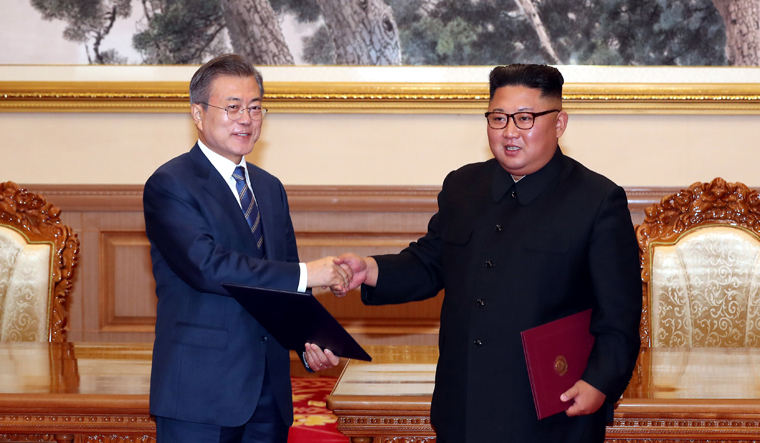Days after North Korea first threatened to cut off all communication channels with its rival South Korea, escalating pressure on the latter for failing to stop civilian activists from floating anti-Pyongyang leaflets across the border, the hermit nation said it will redeploy troops to now-shuttered inter-Korean cooperation sites. They will reinstall guard posts and resume military exercises at front-line areas, nullifying the landmark reconciliation deals reached with South Korea just two years ago. The announcement came a day after North Korea destroyed an inter-Korean liaison office in a choreographed display of anger that puts pressure on Washington and Seoul amid deadlocked nuclear diplomacy.
The demolition was the most provocative act by North Korea since it entered nuclear talks in 2018, though the building in its border town of Kaesong was empty and the North had previously signalled plans to destroy it.
Inter-Korean relations have been strained since the second summit between Kim Jong Un and Trump in early 2019 fell apart because of disputes over how much sanctions relief the North should get in return for dismantling its main nuclear complex, which was seen as a limited denuclearisation measure. Moon and Kim, after the first of their three 2018 summits, agreed to stop all forms of hostile acts against each other, including leafleting campaigns. But the agreement doesn't clearly say civilian leafleting should also be banned.
The North's General Staff said regiment-level units and units supporting them with armed reinforcement will be deployed to the Diamond Mountain resort and the Kaesong industrial complex, both just north of the heavily fortified border. Those sites, once symbols of inter-Korean cooperation, have been shuttered for years due to the economic sanctions imposed on North Korea because of its nuclear program.
The North said it will also resume military exercises and reestablish guard posts in border areas and open front-line sites for flying propaganda balloons toward South Korea. These steps would nullify 2018 agreements reached during inter-Korean diplomacy that were aimed at lowering military tensions at border areas.
Under those agreements, both Koreas halted live-firing exercises, removed some land mines and destroyed guard posts inside their border, the world's most heavily fortified. Some outside experts have said these moves undermined South Korea's security more as the North's nuclear weapons arsenal remain intact. South Korea's government didn't immediately respond to the North Korean military statement. Seoul's Defence Ministry had said on Tuesday it would strongly deal with future provocation by North Korea.
Some outside analysts predicted North Korea would resort to provocation to wrest outside concessions because its economy has likely worsened under the persistent US-led sanctions and the coronavirus pandemic. North Korea may also be frustrated because the sanctions prevent Seoul from breaking away from Washington to resume joint economic projects with Pyongyang. The North's official Korean Central News Agency on Wednesday said the hard-line steps were taken to retaliate for South Korea's failure to prevent activists from floating propaganda leaflets across the border.
South Korea on Tuesday expressed strong regret over the destruction of the liaison office the two Koreas had opened in 2018 when ties flourished. The statement also warned of a stern response if North Korea takes additional steps that aggravate tensions.
North Korea's moves have been a serious setback to Moon's efforts at engagement. Moon champions greater reconciliation with North Korea, met Kim Jong Un three times and was a driving force behind the diplomacy between Pyongyang and Washington.
-Inputs from PTI


